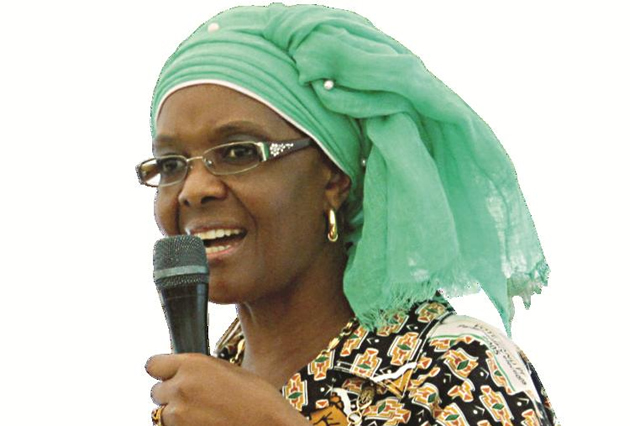First Lady, renowned philanthropist, patron of several charities

THE First Lady Dr Grace Mugabe, a renowned philanthropist, is patron of several charities.
Here we profile the work of some of the charities privileged to have Dr Mugabe as patron.
Musha Mukadzi Zimbabwe Armed Forces Foundation
It is a non-profit organisation that provides programs that help families of the armed forces of Zimbabwe wives and widows and children of either serving or retired soldiers as well as war veterans. It is the brainchild of the Commander of the Defence Forces, General Constantine Chiwenga. Cde Marry Mubaiwa Chiwenga is the National Chairperson.
Musha Mukadzi offers a host of programs, and resources, focused in the areas of non-communicable diseases, disabilities and even poverty. The foundation was launched in 2012.
Vision
To have a society that realises the potential in women
To be captains of industries without being discriminated against
To have a women empowered and self-motivated society
To erase dependency syndrome amongst women
Mission
To create an awareness of women role in society without borders or boundaries
Values
Increasing independence, self-sustainability and confidence among women of the armed forces
Identifying and exercising values in giving and volunteering
Demonstrating the extraordinary impact of women in the society
Musha Mukadzi engages in dialogue to seek collaborative methods that will lead to sustainable and positive change.
Aids Counselling Trust
ACT is a non-profit organisation that was registered under the Private Voluntary Act on 7 June, 1989. Its purpose is to complement government initiatives in the prevention of HIV infection, strengthening and provision of care and support to people living with HIV and Aids and their families.
ACT started as a result of a series of meetings that were held at St Anne’s Hospital in Harare in 1988. Members were citizens concerned with the rapid spread of HIV and its effect. They represented non-governmental organisations, medicine, social science and the clergy. A steering committee which represented the following sectors was put in place.
These were Ministry of Health, the Church, Department of Social Welfare, Non-governmental Organisations, University of Zimbabwe, School of Social Work, City Health Department.
ACT moved to its own premises in 1991. The structure was adapted from being managed by a steering committee to a hierarchical one. Systems and procedures have been developed over the years in order to be more effective and efficient in carrying out its mandate.
ACT is a membership organisation and is governed by a Board whose members represent diverse disciplines and sectors. Training is given to the Board on ‘Governance’ for them to understand their roles and responsibilities, and also on ‘Procedure of Meetings’.
The Board conducts its business through quarterly meetings.
The Treasurer oversees and advises on the financial performance of the organisation. The executive director is the primary signatory on all accounts and the Treasurer co-signs. Two other signatories sign in the absence of the Treasurer. Financial accounts are audited every year by a reputable company and these are presented to the Annual General Meeting.
ACT’s method of operation
ACT’s method of operation is that of facilitating and strengthening the work of communities so that they can be more effective in responding to challenges as dictated by local needs. Initially, the focus was on prevention.
As time went on and there was advancement in the management and treatment of HIV and Aids as well as emergency of other challenges to life,
ACT’s programming took a general developmental approach.
This approach continues to guide all programming. ACT has maintained a small staff contingent so that most resources are channeled to communities.
The organisation’s work is heavily dependent on community volunteers who keep ACT visible within their localities.
Disabilities and gender mainstreaming are crosscutting themes. By ACT’s own policy, there is representation of people living with HIV at every level of the organisation.
ACT Programmes
Advocacy, lobbying and civic education
This Raise constitution
Collect material human sections constitution.
Monitoring human advocate facilities lobby services.
Advocate for allocation antiretroviral
Orphans Children ‘Ndarama’ gem is hidden until digs value appreciated cleaned. Similarly, children express to full until they are necessary pport freedom.
Children’s support groups; PSS camps; Mobile toy and book library
Counselling
Educational assistance
Sexual and reproductive health and rights
This programme focuses on the following:
– Women’s and young people’s sexual reproductive
health and rights
– Gender based violence
– HIV and Aids: Treatment literacy and prevention
– Behaviour change communication
– Mobilise male engagement and participation in
HIV, GBV and SRHR
Forty-two percent of women in Zimbabwe have either experienced physical, emotional or sexual violence (or both) at some point in their lives.
Closely linked to GBV is the spread of HIV. Sexual violence and gender inequalities fuel the spread of HIV.
This is evidenced by the statistics which show that adult women are 1.3 percent more likely to be infected with HIV than males.










Comments